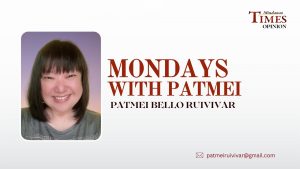It had been a very busy week; attendance in PWD rights forum, an international conference in UM, a media conference and a joint conference in Agusan del Sur.
I was invited to give academic lecture on federalism to researchers, teachers, students, and scientists in a forum at the University of Mindanao attended by a group of scientists from across Mindanao and guests from Republic of Latvia and the University of Moscow in Russia.
I emphasized in the forum that federalism addresses the wealth inequality and the monopolistic control of power; it will unleash the potentials of the country with the maximum benefits going to the countryside.
The centers will continue to grow while the countryside will catch up with growth that left them for centuries already. Dr. Kirill of Russia acceded to the idea, as the potentials of his country was unleashed as a matter of allowing autonomy to all other Soviet states which later became countries in Europe. Dr. Kirill is a scientist whose interest is on butterflies, not politics. A Friday it was.
Saturday was spent with the Davao Media Forum. The DILG XI-Federalism Team headed by Benjie Velarde and with focal persons Edwin Mayormita and Carl gave updates on the federalism initiatives.
The highlight of the forum was the Memorandum Order of DILG XI to the barangay councils to produce a resolution supporting federalism.
The barangay councils are in the best position to express support, and even better, express the urgent desire of the people for the President of the Republic, Rodrigo R. Duterte to change the unitary system characterized by poverty, crime, and hunger, to a system that allows equal opportunity to grow and equity to catch up addressing the vicious cycle of poverty as reason to do illegal drugs.
The barangay councils and the local government units can only limit their functions on governance because resource allocation is determined by population and land size.
Suppose an infrastructure is proposed to improve the competitiveness of the region, it has to be pitched in for evaluation using economic and financial returns. These two criteria can only be answered if population density is high and land command investment attraction. In this format, the rich place will continue to be rich while the poor places will be poorer. This is a simple case with very few exception, the poor will continue to be poor in a unitary setup.
The concern of concentration of powers in federalism is luckily addressed in the Bayanihan Constitution and in the many federalism draft proposals like the Kilos Pideral sa Pagbabgo (KPP) of Atty. Aris Albay, Centrist Democrats of former usec Lito Lorenzana, and the PDP model.
The theories of political parties, electoral reforms, and political dynasties are all riders to federalism. They are not related to federalism but they compound and complicate federalism. To address this, federal advocates propose for stronger political parties that are accountable and auditable by the state.
Political butterflies, or those who switch from one party to another for convenience are punished in federalism; they are forbidden from running in elective offices in any election after they are taken out of their original party. Election of senators will be regional also.
The LGUs will function according to their current setup but with bigger legrooms as additional funds are constitutionally downloaded in the form of block funds and equalization funds. The LGUs will be supervised by the nearest government, the Regional Government, which will ensure that the LGUs within the territory will function according to the ideals and aspirations of the people. If the LGUs and Regional Government are remiss of their roles, the Federal Government steps in.
Sunday was a 10-hour round trip travel to Bayugan City, Agusan del Sur to join the Joint Conference of the Indigenous Peoples and the Guardians-Mindanao. To my delight, our Katutubos embrace federalism because it reinforces their exercise of the bundles of rights that include rights to ancestral domain, self-governance, social justice, and cultural integrity. These four bundles of rights are respected and placed well in the Bayanihan Constitution through the generations of rights.
However, it is a new theory of government and economic principles. It is a new system that will make poor achieve a better living condition. A system that limits political dynasties and improves the bureaucracy, a system that professionalizes elective positions. A system that facilitates cultural integrity and responds to demands of people.
The other names of federalism is moving from poverty, solution to Mindanao issue, release from the control of oligarch, improved competitiveness of the LGUs, countryside-growth-catch-up model, an attractive countryside for investment, and a fully functioning democracy.



